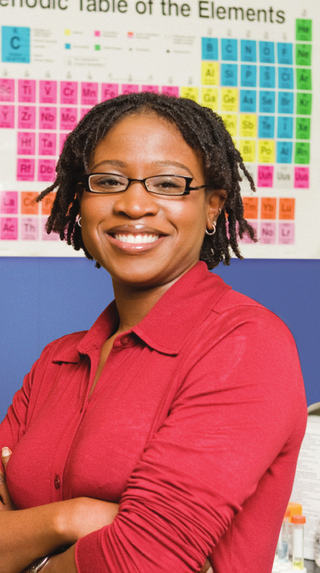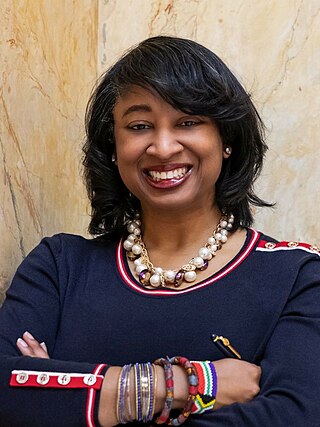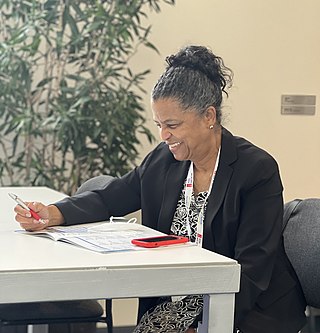Related Research Articles

The University of Maryland, Baltimore County (UMBC) is a public research university in Catonsville, Maryland. It has a fall 2022 enrollment of 13,991 students, 61 undergraduate majors, over 92 graduate programs and the first university research park in Maryland. It is classified among "R1: Doctoral Universities – Very High Research Activity".

Freeman Alphonsa Hrabowski III is an American educator, advocate, and mathematician. In May 1992, he began his term as president of the University of Maryland, Baltimore County (UMBC), one of the twelve public universities composing the University System of Maryland. Hrabowski has been credited with transforming UMBC into an institution noted for research and innovation. Under his leadership, UMBC was ranked the #1 Up and Coming University in the U.S. for six consecutive years (2009-2014) by the U.S. News & World Report magazine. When that designation was retired, U.S. News & World Report began including UMBC on its annual Most Innovative National Universities list.

Anthony Michael Johnson is an American experimental physicist, a professor of physics, and a professor of computer science and electrical engineering at the University of Maryland, Baltimore County (UMBC). He is the director of the Center for Advanced Studies in Photonics Research (CASPR), also situated on campus at UMBC. Since his election to the 2002 term as president of the Optical Society, formerly the Optical Society of America, Johnson has the distinction of being the first and only African-American president to date. Johnson's research interests include the ultrafast photophysics and nonlinear optical properties of bulk, nanostructured, and quantum well semiconductor structures, ultrashort pulse propagation in fibers and high-speed lightwave systems. His research has helped to better understand processes that occur in ultrafast time frames of 1 quadrillionth of a second. Ultrashort pulses of light have been used to address technical and logistical challenges in medicine, telecommunications, homeland security, and have many other applications that enhance contemporary life.

Harold Amos was an American microbiologist. He taught at Harvard Medical School for nearly fifty years and was the first African-American department chair of the school.
Randolph Wilson ("Bill") Bromery was an American educator and geologist, and a former Chancellor of the University of Massachusetts Amherst (1971–79). While Chancellor, Bromery established the W.E.B. Du Bois Archives at the University of Massachusetts, and was one of the initiators of the Five College Consortium. He was also President of the Geological Society of America, and has made numerous contributions as a geologist and academic. During World War II, he was a member of the Tuskegee Airmen, flying missions in Italy.
The University of Maryland, Baltimore County (UMBC) features a variety of research centers and institutes both based on the campus and affiliated with other academic institutions. These centers and institutes listed below seek out to expand their research, educate, and promote partnerships between the university and the Baltimore-Washington Metropolitan Area and beyond.
The STEM pipeline is a critical infrastructure for fostering the development of future scientists, engineers, and problem solvers. It's the educational and career pathway that guides individuals from early childhood through to advanced research and innovation in STEM-related fields.
Joan Y. Reede is an American physician. She is Harvard Medical School's inaugural dean for diversity and community partnership in the Office of Diversity, Inclusion, and Community Partnership. She is also a member of the National Academy of Medicine. She is known for creating programs that mentor and support minority physicians and female physicians. Alumni of her programs have created a 501(c)(3) organization called The Reede Scholars in her honor.

Valerie Sheares Ashby is an American chemist and university professor who currently serves as president of the University of Maryland, Baltimore County. She was the Dean of Trinity College of Arts and Sciences at Duke University from 2015 to 2022 and formerly chair of the chemistry department at the University of North Carolina at Chapel Hill from 2012 to 2015. With her research group, she holds ten patents. On April 4, 2022, it was announced that Ashby would assume the position of president of the University of Maryland, Baltimore County.

Omolola (Lola) Eniola-Adefeso is a Nigerian-American chemical engineer and the University Diversity and Social Transformation Professor of Chemical Engineering, Biomedical Engineering, and Macromolecular Science and Engineering at the University of Michigan. Eniola-Adefeso is also a co-founder and chief scientific officer of Asalyxa Bio. Her research looks to design biocompatible functional particles for targeted drug delivery.

Kafui Dzirasa is an American psychiatrist and Associate Professor at Duke University. He looks to understand the relationship between neural circuit malfunction and mental illness. He was a 2019 AAAS Leshner Fellow and was elected Fellow of the National Academy of Medicine in 2021.
Elizabeth G. Loboa is an American biomedical engineer, inventor, researcher and academic administrator currently serving at Southern Methodist University (SMU) as provost and vice president for academic affairs.

Anna Gifty Opoku-Agyeman is a Ghanaian-born American activist and writer. She is a co-founder and former CEO of the Sadie Collective, as well as a co-founder and co-organizer of Black Birders Week.

Kizzmekia "Kizzy" Shanta Corbett is an American viral immunologist. She is an Assistant Professor of Immunology and Infectious Diseases at Harvard T.H. Chan School of Public Health and the Shutzer Assistant Professor at the Harvard Radcliffe Institute since June 2021.

Sherilynn Black is an American neuroscientist, the Associate Vice Provost for Faculty Advancement, as well as an assistant professor of the practice of medical education at Duke University in Durham, North Carolina. Black's research focuses on social neuroscience and developing interventions to promote diversity in academia. Black has been widely recognized for her commitment to faculty development and advancement and holds national appointments with the National Academy of Sciences, Engineering, and Medicine, the National Institutes of Health, the Howard Hughes Medical Institute, the American Association of Medical Colleges, The Burroughs Wellcome Fund, and the Society for Neuroscience.

Gilda A. Barabino is the president of the Olin College of Engineering, where she is also a professor of biomedical and chemical engineering. Previously, she served as the dean of The Grove School of Engineering at the City College of New York, and as a professor in the Departments of Biomedical Engineering and Chemical Engineering and the CUNY School of Medicine. On March 4, 2021, she became the President-Elect of the American Association for the Advancement of Science.
Crystal C. Watkins Johansson is an American neuroscientist and psychiatrist and associate professor of neuroscience at Johns Hopkins University School of Medicine as well as the director of the Sheppard Pratt Memory Clinic in Neuropsychiatry in Baltimore, Maryland. Johansson was the first Black female Meyerhoff Scholar to obtain an MD/PhD from the University of Maryland, Baltimore County. During her MD/PhD she developed a novel treatment for gastrointestinal in patients with diabetes that led to a patent for a pharmacological compound in 2000. Johansson is a practicing neuropsychiatrist with a focus on geriatric psychiatry and she conducts brain imaging research as well as research on cancer in African American women.

Renetta Garrison Tull is an American electrical engineer, global policy strategist, and works to advance diversity and inclusion in science, technology, engineering, and mathematics (STEM). Tull is the inaugural Vice Chancellor of Diversity, Equity, and Inclusion at University of California, Davis and a founding Director of the National Science Foundation funded program PROMISE: Alliances for Graduate Education and Professoriate, which aims to increase the number of underrepresented students in STEM. Tull previously served as Vice Provost for Strategic Initiatives at the University of Maryland, Baltimore County (UMBC) and was also the Director of Graduate and Professional Pipeline Development for the University System of Maryland (USM) where she also served as the co-Principal Investigator and co-director of the Louis Stokes Alliance for Minority Participation. On a global scale, Tull was selected as the keynote speaker for the United Nations Educational, Scientific and Cultural Organization (UNESCO) event on the Commission on the Status of Women in Engineering Fields, and was the only American and only female finalist for the Global Engineering Deans Council Airbus Diversity Award in 2015.

Marian Cecelia Johnson-Thompson is an American virologist who was a professor at the University of the District of Columbia. She was elected Fellow of the American Association for the Advancement of Science.
Mavis G. Sanders is an American research scientist studying education and Black families. She is senior research scholar of Black Children and Families with Child Trends.
References
- ↑ "A vaunted program for boosting the diversity of U.S. academic scientists is starting to spread". www.science.org. Retrieved 2021-10-14.
- ↑ Lee, Diane M. (2013-01-01). "The Meyerhoff Scholars Program: Changing Minds, Transforming a Campus". Metropolitan Universities. 24 (2): 55–70. ISSN 1047-8485.
- ↑ Denniston, David Folkenflik and Lyle. "Blacks-only aid program dies after justices refuse review COLLEGE PARK'S BANNEKER SCHOLARSHIPS". baltimoresun.com. Retrieved 2021-10-14.
- ↑ Kenneth Maton, Shauna Pollard, Tatiana McDougall Weise, Freeman Hrabowski III (2012). "Meyerhoff Scholars Program: A Strengths-Based, Institution-Wide Approach to Increasing Diversity in Science, Technology, Engineering, and Mathematics". The Mount Sinai Journal of Medicine, New York. Mt. Sinai Journal of Medicine. 79 (5): 610–623. doi:10.1002/msj.21341. PMC 3444508 . PMID 22976367.
{{cite journal}}: CS1 maint: multiple names: authors list (link) - ↑ "Chancellor's Science Scholars at the University of North Carolina at Chapel Hill". Association of American Universities.
- ↑ "Three Universities Unite to Replicate and Spread Successful STEM Program". Howard Hughes Medical Institute.
